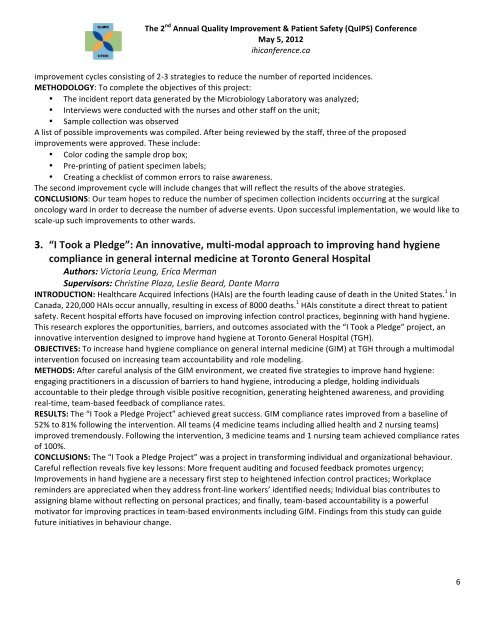QuIPS 2012 Program - QuIPS Conference | UT IHI Open School ...
QuIPS 2012 Program - QuIPS Conference | UT IHI Open School ...
QuIPS 2012 Program - QuIPS Conference | UT IHI Open School ...
Create successful ePaper yourself
Turn your PDF publications into a flip-book with our unique Google optimized e-Paper software.
The 2 nd Annual Quality Improvement & Patient Safety (<strong>QuIPS</strong>) <strong>Conference</strong><br />
May 5, <strong>2012</strong><br />
ihiconference.ca<br />
improvement cycles consisting of 2-‐3 strategies to reduce the number of reported incidences.<br />
METHODOLOGY: To complete the objectives of this project:<br />
• The incident report data generated by the Microbiology Laboratory was analyzed;<br />
• Interviews were conducted with the nurses and other staff on the unit;<br />
• Sample collection was observed<br />
A list of possible improvements was compiled. After being reviewed by the staff, three of the proposed<br />
improvements were approved. These include:<br />
• Color coding the sample drop box;<br />
• Pre-‐printing of patient specimen labels;<br />
• Creating a checklist of common errors to raise awareness.<br />
The second improvement cycle will include changes that will reflect the results of the above strategies.<br />
CONCLUSIONS: Our team hopes to reduce the number of specimen collection incidents occurring at the surgical<br />
oncology ward in order to decrease the number of adverse events. Upon successful implementation, we would like to<br />
scale-‐up such improvements to other wards.<br />
3. “I Took a Pledge”: An innovative, multi-‐modal approach to improving hand hygiene<br />
compliance in general internal medicine at Toronto General Hospital<br />
Authors: Victoria Leung, Erica Merman<br />
Supervisors: Christine Plaza, Leslie Beard, Dante Morra<br />
INTRODUCTION: Healthcare Acquired Infections (HAIs) are the fourth leading cause of death in the United States. 1 In<br />
Canada, 220,000 HAIs occur annually, resulting in excess of 8000 deaths. 1 HAIs constitute a direct threat to patient<br />
safety. Recent hospital efforts have focused on improving infection control practices, beginning with hand hygiene.<br />
This research explores the opportunities, barriers, and outcomes associated with the “I Took a Pledge” project, an<br />
innovative intervention designed to improve hand hygiene at Toronto General Hospital (TGH).<br />
OBJECTIVES: To increase hand hygiene compliance on general internal medicine (GIM) at TGH through a multimodal<br />
intervention focused on increasing team accountability and role modeling.<br />
METHODS: After careful analysis of the GIM environment, we created five strategies to improve hand hygiene:<br />
engaging practitioners in a discussion of barriers to hand hygiene, introducing a pledge, holding individuals<br />
accountable to their pledge through visible positive recognition, generating heightened awareness, and providing<br />
real-‐time, team-‐based feedback of compliance rates.<br />
RESULTS: The “I Took a Pledge Project” achieved great success. GIM compliance rates improved from a baseline of<br />
52% to 81% following the intervention. All teams (4 medicine teams including allied health and 2 nursing teams)<br />
improved tremendously. Following the intervention, 3 medicine teams and 1 nursing team achieved compliance rates<br />
of 100%.<br />
CONCLUSIONS: The “I Took a Pledge Project” was a project in transforming individual and organizational behaviour.<br />
Careful reflection reveals five key lessons: More frequent auditing and focused feedback promotes urgency;<br />
Improvements in hand hygiene are a necessary first step to heightened infection control practices; Workplace<br />
reminders are appreciated when they address front-‐line workers’ identified needs; Individual bias contributes to<br />
assigning blame without reflecting on personal practices; and finally, team-‐based accountability is a powerful<br />
motivator for improving practices in team-‐based environments including GIM. Findings from this study can guide<br />
future initiatives in behaviour change.<br />
6


